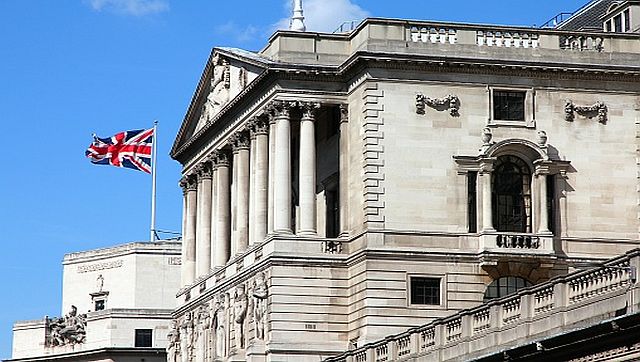
[ad_1]
The rising price of dwelling is biting companies and households round the world. Editors from throughout The Conversation’s worldwide community have requested native tutorial specialists to clarify how their countries and areas are tackling this challenge, in addition to the 2023 outlook for costs and rates of interest the place they stay.
This article is the third in our collection on the place the international economic system is heading in 2023. It follows latest articles on inflation and vitality.
UK: recession on the horizon
At first sight, the UK’s price of dwelling crisis may look pretty gentle in comparison with other countries. Its inflation charge was 10.7 per cent in November 2022, in comparison with 12.6 per cent in Italy, 16. per cent in Poland and over 20 per cent in Hungary and Estonia. But the Bank of England expects a recession in the UK this yr — probably lasting till mid-2024.
This is as a result of the proportion of UK households that lack insulation in opposition to monetary setbacks is unusually giant for a rich economic system. One pre-pandemic survey discovered that three million folks in the UK would fall into poverty in the event that they missed one pay cheque, with the nation’s excessive housing prices being a key supply of vulnerability.
Another not too long ago instructed that one-third of UK adults would battle if their prices rose by simply £20 (Rs 1965.06) a month.
The pandemic noticed over 4 million households tackle additional debt with nearly as many falling behind on repaying it. And latest jumps in vitality and meals payments will push many over the edge, particularly if heating prices stay excessive when the current government cap on vitality costs ends in April.
UK governments have been stealthily elevating taxes since 2010 and in actual phrases (adjusting for inflation) typical UK family earnings was already two per cent decrease in 2018 than in 2007.
But actual incomes have been additional eroded over the previous yr since the UK’s 10.7 per cent inflation charge (as of November) is much above the pay will increase many staff have needed to accept in latest months.
But latest occasions have compelled the authorities to make choices that weren’t essentially aligned with the looming recession. In September 2022, Liz Truss grew to become prime minister with daring pledges to remedy the UK’s financial malaise.
The international monetary markets responded dramatically to her tax reducing plans by mountaineering the curiosity they cost the UK authorities and companies to borrow.
This compelled the newly put in chancellor Jeremy Hunt to embark on one other spherical of public spending cuts and tax will increase in November — actions governments often reserve for the peak of a increase, not the eve of a droop.

The Bank of England can also be doing the reverse of what central banks want to do earlier than a downturn. High inflation compelled it to boost charges to three.5 per cent in December, with extra rises anticipated in 2023. Pixabay
The Bank of England can also be doing the reverse of what central banks want to do earlier than a downturn. High inflation compelled it to boost charges to 3.5 per cent in December, with extra rises anticipated in 2023.
This boosts debt repayments for the tens of millions who’ve borrowed to purchase their houses, to not point out these with unsecured bank card or overdraft debt.
All of those further prices subtract from a family’s disposable earnings. And as a result of family consumption makes up near 60 per cent of all spending in the UK economic system, this may inevitably result in recession — which might nicely become very painful and very lengthy.
US: central financial institution indicators warning
Inflation elevated considerably in the US in late 2021 and early 2022, reaching ranges larger than at any time in the final 40 years. The Federal Reserve responded by aggressively elevating its benchmark charge (the federal funds charge) seven instances since March in an effort to stabilise costs. A few smaller will increase are anticipated in 2023.
The US shopper value index, a typical measure of inflation, exhibits that costs peaked in June 2022, growing by 9.1 per cent over the earlier yr.
The index has decreased each month since June, with the November knowledge — the most up-to-date out there — indicating that US costs are 7.1 per cent over the prior 12 months.
The fed funds charge serves as a benchmark for other rates of interest, similar to mortgage charges. Its latest will increase have began to cut back demand for items and providers and funding.
For instance, current residence gross sales in November have been 7.7 per cent decrease than in October and are down over a 3rd from a yr earlier. The underlying cause is that mortgage rates of interest have greater than doubled to over six per cent, after reaching seven per cent in October, from three per cent in the starting of 2021.
The ripple results of the discount in housing demand will proceed to sluggish financial exercise for months to come back as a result of a few of the impacts of financial coverage happen with a lag.
The Fed is now signalling that it’s going to proceed to boost rates of interest in early 2023 earlier than pausing, a cautious strategy that’s justified by quite a lot of financial knowledge.

The US shopper value index, a typical measure of inflation, exhibits that costs peaked in June 2022, growing by 9.1 per cent over the earlier yr. Image used for representational functions/Pixabay
This is partly as a consequence of continued power in the labour market as unemployment stays low, wages that haven’t been adjusted for inflation continuing to rise, and roughly 10 million jobs remaining open, in keeping with the newest knowledge.
To the extent that corporations have to boost wages to draw or maintain staff, this may increasingly result in larger costs and persistent inflation.
This challenge is particularly necessary given the ageing inhabitants in the US and the impact it has on the labour market.
At the identical time, the latest fall in vitality costs is unlikely to proceed, so additional reductions in inflation should come from declines in other areas, similar to shelter and meals.
Australia and New Zealand: utilizing restraint to ease inflation
The common survey of financial forecasts printed by The Conversation Australia at the begin of 2022 was titled: Top economists anticipate RBA to carry charges low in 2022 as actual wages fall.
This forecast for a way the Reserve Bank of Australia would set charges in 2022 was spectacularly incorrect. The second half turned out to be fairly proper: actual wages did fall, though not as a result of they continued to barely develop as the specialists had been anticipating, however as a result of their development was dwarfed by an explosion in inflation.
After hovering beneath the Reserve Bank’s two-three per cent goal band for many of the earlier 5 years, Australia’s annual charge of inflation started 2022 at 3.5 per cent however shot as much as 5.1 per cent in March after Russia invaded Ukraine and reached 7.Three per cent for the yr to September.
The financial institution expects something near eight per cent for the yr to December when the figures are subsequent up to date in late January.
Australia’s neighbour New Zealand has skilled a lot the identical factor, with an inflation charge that additionally hit 7.Three per cent and has since slipped to 7.2 per cent. But its response has been dramatically totally different.
Whereas Australia’s Reserve Bank elevated its charge in eight small month-to-month steps from May, both by 0.25 or 0.5 factors, New Zealand’s Reserve Bank started pushing up charges a lot earlier and extra aggressively — together with a latest 0.75 level hike, even because it forecasts a New Zealand recession.
In Australia — not like New Zealand, the US, the UK and a lot of the remainder of the developed world — a recession isn’t generally forecast, largely due to the financial institution’s restraint in the face of a three-decade inflation excessive.

Global oil and wheat costs are down one-quarter to one-third from mid-2022 peaks following Russia’s Ukraine invasion. Image used for representational functions/Pixabay
This strategy has served Australia nicely over the 29 years till the COVID recession in 2020. The nation prevented the “Great Recession” after the 2007-08 international monetary crisis and the 2001 “tech wreck” recession that hit the US and a lot of the remainder of the world in 2001.
This restraint additionally displays a perception amongst authorities that a wage-price spiral isn’t taking maintain in Australia. Wage development stays mired at 3.1 per cent, nicely beneath New Zealand’s 7.Four per cent.
And inflationary strain appears to be easing. Global oil and wheat costs are down one-quarter to one-third from mid-2022 peaks following Russia’s Ukraine invasion.
The Reserve Bank reckons Australian inflation will slide all through 2023, slipping to 4.7 per cent by the finish of 2023, and to three.2 per cent by the finish of 2024, nearly again to its two-three per cent goal band.
By being much less hawkish than its international counterparts, the financial institution hopes to stay on the proper facet of historical past.
France: managing value will increase comparatively nicely (for now)
Inflation is an space the place France seems to be extra resilient than its neighbours. In December 2022, the nation’s inflation charge (measured by the shopper value index) was 6.1 per cent, in contrast with 10 per cent in Germany, 11.eight per cent in Italy and 9.Three per cent in the UK.
The main problem confronting countries and contributing to inflation is the latest surge in vitality costs.
The essential problem dealing with countries, and contributing to inflation — and even stagflation (which refers to a mix of inflation and low financial development) in the case of some economies — is the enormous improve in vitality costs in recent times.
Faced with this rise, the whole French state price range dedicated to mitigating family vitality payments is about to succeed in no less than €75 billion (Rs 6522.60) throughout 2022 to 2023, by schemes together with vitality vouchers and a tariff defend.
These actions have stored the inflation charge nicely beneath that of most European economies. In addition, France is much less reliant on fossil gas merchandise, and subsequently much less susceptible to vitality value fluctuations.
Energy points apart, countries are additionally impacted by the international market similar to corporations are affected by their institutional atmosphere. As a outcome, future modifications in public coverage might affect the inflation charge, which can or could not have peaked.
For instance, the European Central Bank’s choice to boost rates of interest for the first time in a decade final July might weigh on countries’ budgets, giving governments much less room for manoeuvre as they attempt to comprise value will increase.
Without some regional stability when it comes to politics and economics, France could not be capable to proceed to outperform its neighbours in the coming months.
Spain: inflation, public spending, deficit and debt
After starting 2022 with inflation at 6.1 per cent, Spain’s shopper value index peaked at 10.eight per cent in July earlier than closing out the yr at a charge of 6.eight per cent.
Taking into consideration the 2021 inflation journey from 0.5 per cent in January, to 2.9 per cent in July and 6.5 per cent in December, it now appears like value rises are being introduced beneath management.
Core inflation (which excludes unprocessed meals and vitality) noticed a extra gradual however sustained rise. It was 2.Four per cent in January 2022, peaked at 6.Four per cent in August and fell to six.Three per cent in November.
The closing hole with headline inflation throughout the ultimate quarter of final yr was primarily as a consequence of authorities measures to management the rise in vitality costs.
Inflation in Spain, 2021-2022
Like many other countries, Spain lacks management and effectivity with regards to public spending. The nation’s pension system should help a quickly rising older inhabitants; it’s extremely depending on fossil fuels; the unemployment charge has been above 10 per cent since 2008; and — once more like other countries — it’s affected by deep political and social polarisation proper now. A excessive public deficit has additionally helped inflate the Spanish debt bubble.
But that is an election yr for municipal, regional and normal authorities and so main reforms might be tough — notably something that impacts Spain’s 9 million pensioners or its greater than three million public staff.

Digitalisation and coaching might present an answer by supporting extra environment friendly administration of sources. Image used for representational functions/Pixabay
Digitalisation and coaching might present an answer by supporting extra environment friendly administration of sources. This might assist to gauge out there sources and develop methods to seek out financial savings whereas additionally addressing the wants of Spain’s folks.
It is mindless that despite the fact that productiveness is now larger due to know-how, social inequality prevails.
Hopefully 2023 will see extra dialogue of digital identification and currencies and even common earnings, and much less of the phrases that characterised 2022: crisis, struggle and inflation.
Indonesia: seven-year inflation excessive results in huge layoffs
While comparatively low in comparison with other countries, Indonesia’s general inflation rose to its highest degree in seven years, reaching almost per cent in September 2022. Ballooning meals and subsidised gas costs are behind this improve.
At the starting of this yr, Indonesia, the world’s largest crude palm oil producer struggled to regulate cooking oil costs as a consequence of a provide bottleneck, regardless of having fun with the monetary advantages of the commodity’s value improve.
More usually, the costs of staple commodities — from rice to spices — additionally rose on the again of failed harvests as a consequence of unpredictable climate. In addition, the ongoing struggle between Russia and Ukraine partially contributed to rising meals costs, particularly meals for animals, which grew to become dearer and affected livestock costs.
The authorities’s choice to increase subsidised gas costs by 30 per cent in September delivered an additional blow to the nation’s inflation charge.
This inflation has elevated the price of dwelling because it has not been accompanied by a ample wage will increase. In 2022, Indonesia’s minimal wage elevated solely by 1.09 per cent — the lowest-ever recorded charge.
With annual inflation hitting 5.51 per cent, it implies that the buying energy for these on decrease incomes has declined by 4.42 per cent.
Job alternatives are much more restricted amid excessive inflation charges. Export-oriented manufacturing corporations have begun to hold out mass layoffs.
Digital start-ups, the hope of younger folks throughout the pandemic, have additionally minimize worker numbers. At the identical time, 4 million new staff joined the labour market between August 2021 and 2022, whereas Indonesia already has a youth unemployment charge of 16 per cent — comparatively excessive for southeast Asia.
Meanwhile, to curb inflation, the central financial institution raised rates of interest by two per cent between July and December 2022, triggering a rise in lending charges. More than 70 per cent of home purchases in Indonesia depend on mortgages and it may also now be tougher for brand new companies to entry much-needed loans.
While state revenues from commodities are growing as a consequence of the latest bonanza, inflation in 2023 is anticipated to stay excessive, largely as a consequence of elevated transport prices pushed by risky gas costs.
The Indonesian authorities now must rethink inflation coverage and public service prices similar to healthcare insurance coverage charges and public transportation charges. These gadgets have an effect on most individuals and will set off a further inflationary influence.
This article is republished from The Conversation beneath a Creative Commons license. Read the authentic article.
Read all the Latest News, Trending News, Cricket News, Bollywood News,
India News and Entertainment News right here. Follow us on Facebook, Twitter and Instagram.
[ad_2]
Source hyperlink